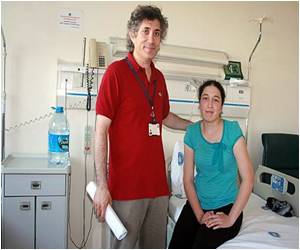PCS can be diagnosed with just an ultrasound, CT and/or MRI but doctors often misdiagnose the problem and suggest unwanted surgery rather to treat the pain.

Women who have this illness have a feeling of pain while passing urine (dysuria). Another symptom would be having pain during intercourse, or Dyspareunia. It often goes unreported by many women afflicted with pelvic congestion syndrome who are likely to avoid intercourse.
The cause of pelvic varicosities is reflux or backward flow of blood in the ovarian veins due to the absence of functioning valves, which result in retrograde blood flow and eventful venous dilatation. The symptoms of PCS or pelvic congestion syndrome is pelvic pain, which causes dull ache, without evidence of inflammatory disease.
Clinical signs seen by a physician may include vulval varicosities extending on to the medial thigh and long saphenous vein territory as well as tenderness on deep palpitation at the ovarian point. These symptoms may not always be present.
The illness can be diagnosed through non-invasive imaging -ultrasound, CT and MRI, --which could help in excluding alternative causes of pelvic pain. It would then provide a road map for novel minimally invasive treatment options that are now available.
Before the advent of non-surgical endoluminal therapies for pelvic congestion syndrome medical therapy with hormonal manipulation was the first-line therapy. Those women whose symptoms did not respond to medical management were then often referred for surgical removal of uterus and ovaries (hysterectomy and oophorectomy). Now that endoluminal therapy is available, these surgical options are often reserved for when all other modalities have failed.
This newer day-care procedure called as Percutaneous Venous Embolisation is now accepted as a valuable treatment option for Pelvic Congestion Syndrome with promising results from early clinical trials and is fast becoming the first-line treatment option for this condition. Transcatheter Embolization Therapy for PCS was recently addressed by the American Venous Forum and the Society for Vascular Surgery and given a grade 2B recommendation.
In Medanta located in the National Capital region of Delhi, patients experience up to 80% success rate and usually require no further intervention.
The majority of women in India are unaware of Pelvic Congestion Syndrome and they unnecessarily are misdiagnosed and undergo unwanted surgery or non-specific treatment for pelvic pain without real benefit.
The advantages of this treatment include: (i) it is very effective in improvement in pelvic pain. (ii) general anesthesia is usually not used for embolization unless clinically warranted. (iii) There are almost no alarming complications. Infection has not been reported after embolization (iv) it requires less recovery time. (v) post embolization patients are virtually never admitted to the hospital and (vi) even patients with physically demanding jobs may return to work within a few days.
The non-surgical treatment of chronic pelvic pain is slowly gaining ground in India. It is bound to revolutionize the management of chronic pelvic pain among women in north India. After the procedure patients up to 80% of women report an improvement of symptoms within the first two weeks after embolization and usually require no further intervention.
Embolization allows women to return to life sooner and in better health.
Source-ANI
 MEDINDIA
MEDINDIA




 Email
Email








